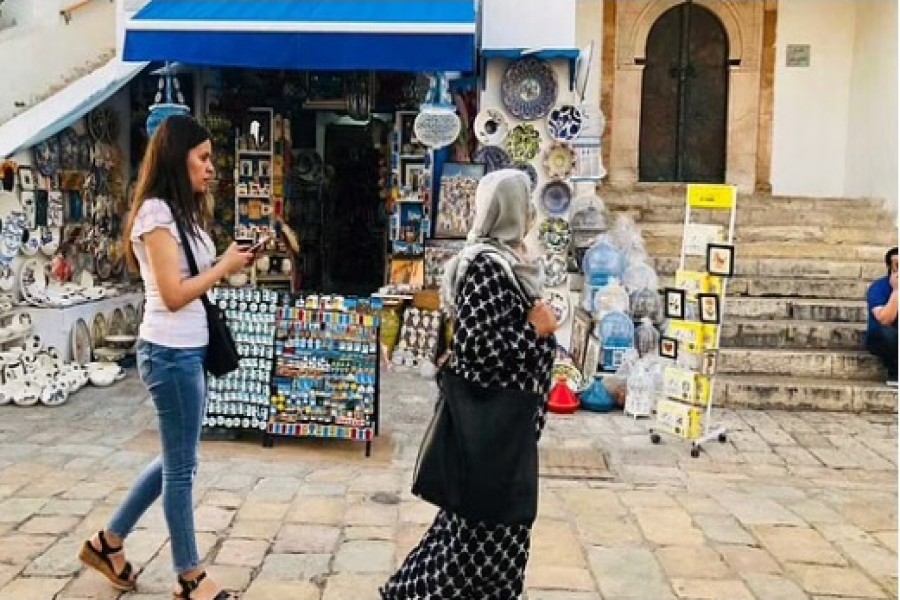When dozens of Tunisian judges went on strike last month to protest the sacking of 57 of their colleagues, lurid posts containing damaging allegations about some of the female jurists began appearing on Facebook.
One said police had ordered a virginity test to be carried out on one of them in 2020, attaching an image purporting to be the medical report. Another targeted judge Khaira bin Khalifa, saying falsely that she had once been charged with adultery, a crime in Tunisia, news agency Reuters reported.
"I was destroyed, and my family was defamed for the sake of settling personal scores," Bin Khalifa told an emergency meeting of the Tunisian Judges Association.
The judges' strike began after the mass sacking of judges in early June by President Kais Saied, who called Monday's referendum over a new constitution that would formalise his sweeping seizure of powers.
In Tunisia and other Arab states, the malicious posting of personal information on social media - known as doxxing - is increasingly being used to harass and intimidate women, anti-government protesters and LGBTQ+ activists.
"Doxxing is a repressive tactic, especially when used against the most vulnerable in society such as women and queer activists," said Marwa Fatafta from Access Now, a digital rights group.
"Essentially, your personal information is turned into a weapon pointed against you," said Fatafta, the organisation's policy manager for the Middle East and North Africa (MENA) region.
The increasing presence of women online and the rising popularity of social media platforms such as Facebook and Twitter has made doxxing and other forms of online harassment such as so-called revenge porn and sextortion more widespread.
A U.N. Women survey last year of eight Arab nations including Jordan, Lebanon, Morocco and Tunisia found about half of female internet users felt unsafe due to online harassment.
"Online violence represents a serious threat to the women's physical safety and mental wellbeing," the report said, adding that many women who were targeted opted for self-censorship or withdrew from online spaces altogether.
POOR IMPLEMENTATION
Across the region, several countries have laws aimed at curbing online abuse and harassment of women.
A 2017 Tunisian law addressing violence against women contains a broad definition of violence, including economic, sexual, political and psychological abuse.
Egypt, Lebanon and Saudi Arabia also penalise harassment on social media platforms, while Morocco's Penal Code refers to various types of online violence.
But implementation is patchy, said Entessar El-Saeed, head of the Cairo Center for Development and Law.
"The authorities do not enforce the laws," said El-Saeed, noting that many women were too scared to report online sexual abuse - fearing social stigma and protracted legal proceedings that often lead nowhere.
Online harassment can have tragic consequences in the socially conservative region.
During the last year, two Egyptian teenagers died by suicide after being blackmailed with threats to post intimate photographs online.
Several women journalists and activists in the region had their intimate photos and chats leaked online last year after their devices were hacked with Pegasus spyware.
Government authorities have not commented on the hacks.
The doxxing attacks on the protesting judges were the latest such incidents in Tunisia since Saied moved against parliament last summer, giving himself the right to rule by decree.
Pro-government groups shared the photos, phone numbers and home addresses of dozens of women and LGBTQ+ protesters in a bid to silence them, said Fatafta.
In some cases, however, doxxing has been used in the region to hold public officials to account. Activists in Lebanon shared the personal details and real-time locations of politicians they blamed for the country's financial collapse.
'LAZY' PLATFORMS
But in lieu of effective state measures to tackle harmful doxxing, digital rights groups and local activists are leading efforts to clamp down on the practice.
Access Now has a digital security helpline to support activists and journalists, and flags doxxing cases to social media platforms - lobbying them to make it easier for victims to report.
In Egypt, a platform called Qawem, meaning resist in Arabic, supports women who are exposed to sextortion and online abuse.
The nonprofit - which has about 980,000 followers on Facebook and 10,000 followers on Instagram - receives hundreds of messages every day from women who are being blackmailed or abused online, said founder Mohamed Elyamani.
Hundreds of female volunteers offer psychological support, investigate complaints and try to help victims reach a solution, said Elyamani.
Social media platforms are not doing enough to crack down on online harassment on their sites, said Rasha Abdulla, a professor of journalism and mass communication at the American University in Cairo.
"It takes a minute to defame someone on social media, and in our region, platforms have been extremely lazy about eliminating doxxing cases," she said.
"Personal data usually takes a lot of time to be taken down, and usually after the harm has already been done," she added.
Facebook and Twitter did not respond to requests for comment.
After the women judges in Tunisia were doxxed in June, a group of human rights organisations called for a specific law on cyberviolence against women, as concern grows about a wider rights crackdown after Monday's constitutional referendum.
"This constitution needs clear and straightforward articles about protecting women from online abuse," said El-Saeed.


